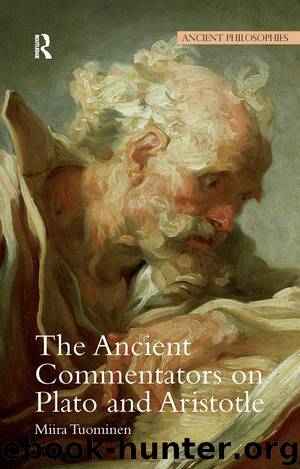The Ancient Commentators on Plato and Aristotle by Tuominen Miira

Author:Tuominen, Miira.
Language: eng
Format: epub
ISBN: 9781317492580
Publisher: Taylor & Francis (CAM)
Commentators on the metaphysical status of perceptible objects
We mentioned above that, within the Aristotelian framework, perceptible objects are external things. Alexander, Themistius and Philoponus confirm that they endorse this supposition as well. Themistius, for example, distinguishes between perception (aisthēsis) and knowledge (epistēmē) exactly on the basis of whether the objects are external or not. Perception, he says, needs to be activated by objects that are outside (exōthen), like visible, audible and tangible objects, but this is not the case with knowledge: its objects (ta epistēta) are internal (oikothen). In this respect, the intelligible objects or thoughts (ta noēmata) resemble objects of knowledge. We gather and store them up in our soul and, having gathered them, we are capable of using them whenever we wish. Their being internal does not mean that they would be subjective in any interesting sense of the word. Rather, as Themistius points out, it is supposed that the objects of knowledge are the same in all individuals (in de An. 104,7–11; see § “How do we come to grasp intelligible objects?”, below).
The main contrast between being external and being internal seems to be whether an activity needs to be initiated by an object. As Themistius puts it, the objects of perception cannot be activated by the soul; it is nature that does so. (Them. in de An. 56,17–25). Therefore, even a toothache, which is not external in the same sense as the qualities of bodies (colours, sounds and so on) are, would be external in this sense: we do not feel toothache if we do not have one (at least if we are mentally sane). Aristotle also supposes that we perceive that we perceive. Here the object of perception seems to be something non-external, a point that was made in the later commentaries (see § “Perception requires rational reflexivity”, below). However, even in this case, there needs to be an external activator of the process: we do not perceive that we perceive unless we perceive, and our perception is about an external object in the sense employed here. Alexander points out in his commentary on the De sensu that when we perceive that we perceive, the object of this perception is primarily the ordinary object of perception (colour, sound, odour, flavour, tactile property) and only accidentally the perception itself. As opposed to perceptible objects, the intelligible ones are internal in the sense that once we have obtained them, we can think whatever we wish.
Further, perceptible objects are taken to be independent of the percipient in an important way. Alexander and Philoponus are clear on this point. They both distinguish between (i) what it is for a quality to be what it is and (ii) what it is for it to be perceived. For example, Alexander says quite clearly that colours can exist without being seen, but they cannot exist as seen apart from perception (Alex.Aphr. in Sens. 42,7–10). Alexander’s main point is to deny the position according to which perceptible qualities such as colours and sounds come to be in the same birth as the perception of them.
Download
This site does not store any files on its server. We only index and link to content provided by other sites. Please contact the content providers to delete copyright contents if any and email us, we'll remove relevant links or contents immediately.
The Secret History by Donna Tartt(19034)
The Social Justice Warrior Handbook by Lisa De Pasquale(12183)
Thirteen Reasons Why by Jay Asher(8885)
This Is How You Lose Her by Junot Diaz(6873)
Weapons of Math Destruction by Cathy O'Neil(6261)
Zero to One by Peter Thiel(5782)
Beartown by Fredrik Backman(5734)
The Myth of the Strong Leader by Archie Brown(5495)
The Fire Next Time by James Baldwin(5426)
How Democracies Die by Steven Levitsky & Daniel Ziblatt(5211)
Promise Me, Dad by Joe Biden(5141)
Stone's Rules by Roger Stone(5080)
A Higher Loyalty: Truth, Lies, and Leadership by James Comey(4947)
100 Deadly Skills by Clint Emerson(4915)
Rise and Kill First by Ronen Bergman(4776)
Secrecy World by Jake Bernstein(4739)
The David Icke Guide to the Global Conspiracy (and how to end it) by David Icke(4697)
The Farm by Tom Rob Smith(4501)
The Doomsday Machine by Daniel Ellsberg(4482)
